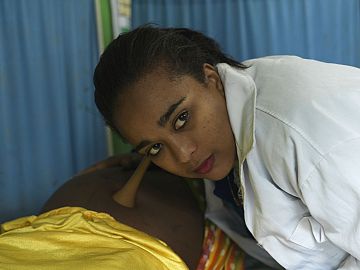Malaria Consortium join discussions with UK Government on climate change and global health
10 June 2022
Yesterday, Malaria Consortium’s Senior Country Technical Coordinator in Nigeria, Olusola Oresanya, joined civil society representatives at a roundtable convened by Action for Global Health (AfGH) and the UK Government’s Foreign, Commonwealth and Development Office to discuss climate change and global health.
The Government’s latest International Development Strategy promises to put strengthening health systems at the core of their long-term, cross-sectoral approach and lists climate change and global health as priority areas. The discussions yesterday were an opportunity for civil society organisations working in the health sector to share their expertise and better understand how the UK government plans to enact their commitments.
Climate-related changes are likely to put vulnerable population groups at a greater risk of exposure to disease and ill health through disruptions to environmental and social conditions, including population displacements and mass movement with antecedent health challenges related to this.
Malaria is one of the most climate-sensitive vector borne diseases. Whether due to short-term deviations in the climate or natural external factors, climate change and variability can directly and indirectly impact on transmission. Research suggests that climate change could increase the population at risk of acquiring malaria by 5–7 percent across Africa by 2100 and result in 60,000 additional malaria deaths per year between 2030 and 2050.
Malaria Consortium believes a holistic, system-wide response is needed to strengthen health resilience to climate change in sub-Saharan Africa and improve climate and health linkages, governance mechanisms to manage them, institutional and technical capacity to design plans, and resources to implement them. Adequate resources must be allocated to build countries’ capacities to identify, monitor and manage the direct and indirect impacts of climate-related health risks and this should be integrated within existing efforts to strengthen all levels of the health system — district, regional and national.
To achieve this, the UK Government should support low- and middle-income countries (LMICs) to implement comprehensive surveillance systems that enable governments to map determinants of health, identify at-risk populations and document weaknesses and gaps across different levels of the health system so that they can build early warning systems and appropriately resource a targeted, context-specific and needs-based response. Investment in developing the capacity of stakeholders at all levels of the health system, from government through to health workers and communities to recognise and respond to the different effects of climate change on health is also essential to building countries’ and communities’ related resilience.
Malaria Consortium will continue to work with AfGH and other civil society organisations to advocate for climate change mitigation and adaptation measures integrated into the UK’s funding decisions for overseas health programmes.
Related content
10 August 2021
Resilient health systems are vital in response to global warming
5 November 2021Five ways to combat the impact of climatic changes on malaria in Ethiopia
15 November 2021COP26: What needs to happen next to secure the world's health?
Climate position statement
Latest news
- International summit calls for AMR accountability in public health interventions21st March 2024
- Global SMC community celebrates new milestone at SMC Alliance Annual Meeting in Nigeria6th March 2024
- Scaling up key interventions could halve pneumonia-related childhood mortality13th February 2024
- Malaria Consortium and eGov Foundation join Mozambique’s national malaria programme to digitalise seasonal malaria chemoprevention campaigns8th February 2024
- World’s first malaria vaccine rollout launched in Cameroon22nd January 2024
- Digital solutions driving equitable access to health6th December 2023